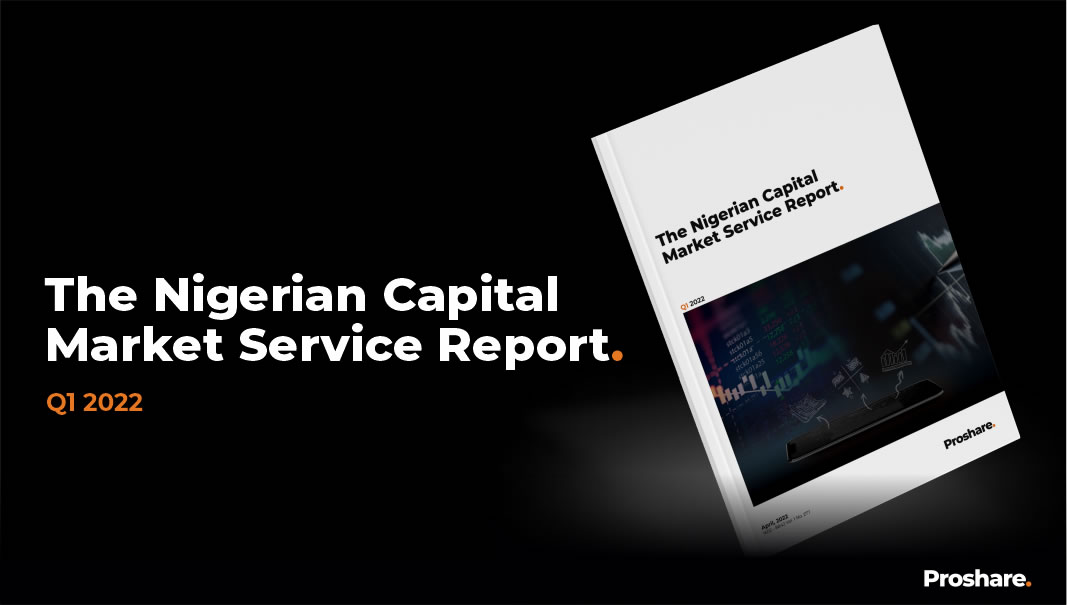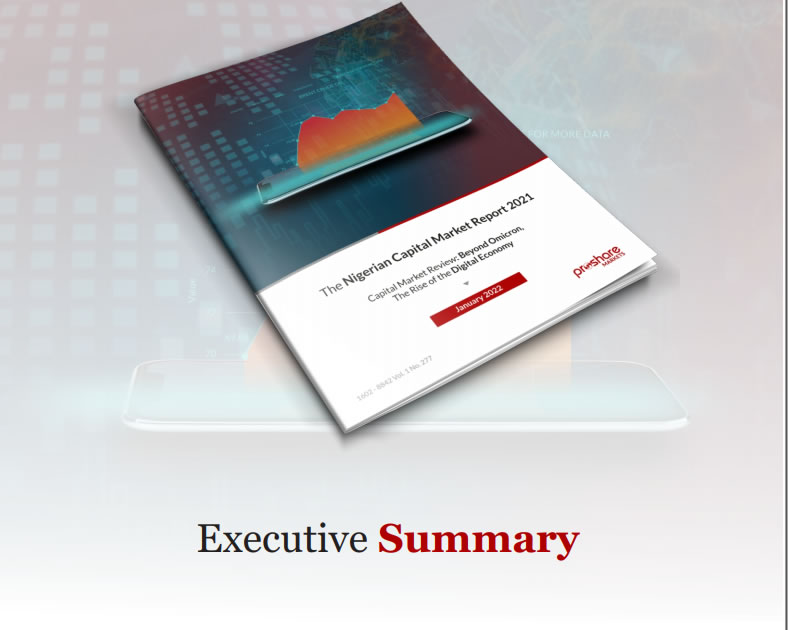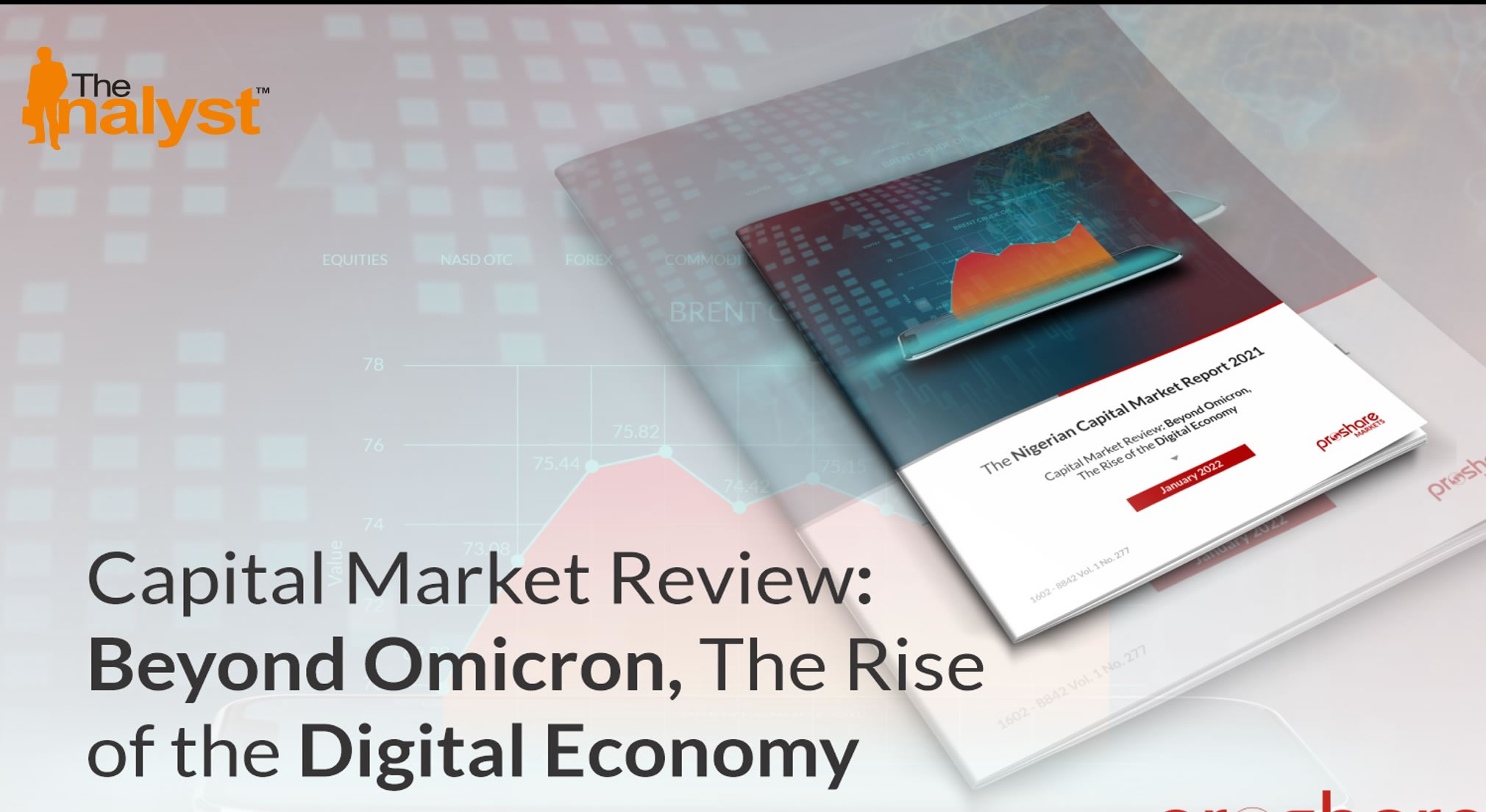Download the Full PDF Reports Here:
Nigeria’s capital market is like a soccer player out of a youth academy, he or she is full of hunger with fire blazing from his or her eyes as he or she feels a sense of destiny and a connection to his or her heroes and their exploits. He or she is skillful, fast, and motivated. He or she is focused on a journey, and he or she is passionate. However, they lack experience, are impatient, and are full of kinetic energy unschooled by the hard knocks of life. Wait a minute, Is this a fair description of Nigeria’s capital market? Certainly not.
The Nigerian capital market is much older than the post-academy kid and is more like a football player in mid-career preeminence with a mid-life crisis. A few of the pressing issues that are hurting the market include but are not limited to the following challenges:
1. Oversight inertia. The Securities and Exchange Commission (SEC) has become more active in its functions but still defers to reaction rather than anticipation. With new technologies such as ChatGPT emerging as tools for market decision-making, and distributed ledger technology (DLT) becoming increasingly important in the payment and settlement architecture of the market, the SEC must come across stronger. Currently, issues around cross-border equity purchases using digital Apps are still at the sandbox (experimentation) stage and have not evolved into clear-cut oversight and operational guidelines.
2. Financial market infrastructure upgrade. The market regulator has also been coy in settling the issues of market architecture for payment and settlement infrastructure ownership. The major payment settlement framework of the CSCS has shown strength over time but it must ease into a new phase of deeper engagement with technology and the broader use of distributed digital ledgers. Within this context, there is a need to resolve digital ledger linkages across settlement infrastructure in the market. The linkages should be in preparation for an intercontinental linkage of markets. Centralized clearing offers notable benefits over bilateral clearing systems, but multiple exchange integration becomes increasingly important for systemic efficiency and effectiveness (see illustration 1 below).
Illustration 1
3. Financial market infrastructure ownership. The ownership of the CSCS has been a matter of quiet discontent among capital market stakeholders. The arm wrestling between the FMDQ and NGX on their relative equity stakes in the CSCS has provided texture to shape market direction and ideology. For example, FMDQ represents a heavy money market stakeholder interest, including the Central Bank of Nigeria (CBN). Furthermore, the board of the FMDQ reflects CBN’s representation in the capital market in addition to the presence of tier 1 deposit money banks (DMBs) in the capital market’s payment and settlement ecosystem. The presence flows into the exercise of power over Nigeria’s principal capital market infrastructure.
The interlocking share ownership needs to be audited for governance and competitiveness compliance. For example, the NGX had a 44.1% ownership of the CSCS in 2022, while the FMDQ allegedly bought an 8% stake but had expressed interest in acquiring a 21.8% shareholding. It is understood that an obscure, SEC rule 138, requires that no single entity should hold more than a 35% equity stake in a financial market infrastructure (FMI). Considering this rule, the NGX has been instructed by the market regulator to sell down its equity stake in the CSCS. These, among other issues, provide fodder for market influence gamesmanship ahead (see illustration 2 below).
Illustration 2:
4. The schooling of capital market operators. The Chartered Institute of Stockbrokers (CIS) has attempted a hop-skip-and-jump in capital market education. The Institute has promoted a Bill at the national assembly (NASS), establishing a new body for capital market education called the Chartered Institute of Securities and Investment (CISI). At face value, this would not be a bad initiative as it broadens the skill requirements of operators in the stock market (as distinct from the capital market, a broader jurisdiction). In a world that evolves within shorter service delivery cycles with the advent of technology, an agile professional education framework is not an option, but the only viable solution for business continuity.
The problem with the CISI initiative, however, is that the Bill supporting it creates a professional monopoly that has no precedence anywhere, and rests on professional hubris rather than best global practices. A random thought of engagement with the artificial intelligence (AI) Bot, ChatGPT, returned a response that sealed any thoughts of promoting a professional capital market education monopoly, noting that ‘the financial education industry is a competitive and diverse market…’ (see illustration 3 below).
Illustration 3: ChatGPT Response to Professional Financial Education Monopoly
5. SEC Funding and its consequences. The SEC is a pivotal institution that provides regulatory context for the movement of investment capital. Its sensitive and crucial nature in guiding capital market activities suggests that its funding must be devoid of influence from market operators. In this sense, the institution should be shielded from the fiery desires of traders and market speculators. The regulatory body like Caesar’s wife must be above board. What does this mean in practical terms? It means that the regulator cannot depend on the market’s traders and other professionals to earn revenues that sustain its operations. The market regulator should be supported by the federal government in a way that does not compromise its professional independence. The corollary is that the regulator should not be seen as a profit centre from where the federal authorities can pull funds into the federation account.
A situation where the SEC relies on secondary market transaction fees to fund its operations may be a challenge because it comes with legal implications in the event of market infractions. The compelling argument of a school of thought is that the SEC should be funded by the federal government and supported by revenues that come from fees, fines, and charges. However, an alternative school of thought insists that secondary market SEC fees occur in most global markets, and the fact that the SEC benefits from transactions subject to disputes do not compromise neutrality and commitment to equity and fairness. The SEC fees charged are the cost of regulatory services rendered in any transaction and should not be seen as a benefit of an infraction.
The Nigerian capital market is at crossroad involving rapidly changing customer journey expectations, disruptive technology evolution, and market-restricting regulatory gaps. The regulators and operators must work swiftly to engage in collaboration to strengthen the ecosystem and make it user-friendly and digitally agile. The writers of the report note that the market must work from imagination rather than memory and that participants including investors and the markets’ self-regulatory organizations (SROs) and SEC must elevate their game to best global practices. Indeed, the art of success would require that they lead value-creating innovation rather than follow the reactive actions of others.
Proshare analysts concluded that if markets must grow, they must have the capacity and preparedness to stand up to uncomfortable truths. Markets are like humans, what does not kill them makes them stronger. Nigeria’s capital market faces a kaleidoscope of problems that require time, intelligence, and agility. The report notes that if Nigeria's capital market must move past operational, human, and legal crossroads, it must have the courage to face its demons.
Section 1 of the report took a broad sweep of the global capital market and highlighted the key developments of 2022 and the emerging opportunities that are based on the new distributed ledger technology (DLT) and other blockchain-enabled applications. The analysts noted that in the brave new world of artificial intelligence and machine learning, (AI/ML) the processing and use of data becomes a competitive delimiter of success and failure, adopters thrive, and non-adopters dive.
The section contextualizes the state of global markets for long-term capital and points out that both ‘slowbalization’ and ‘fragmentation’ could harm the markets for debt and equity at international, continental, and national levels. Staring down disaster is a tough act of courage, enlightenment, and to some extent hubris.
Section 2 went into the heart of technological matters as they relate to the capital market. If the Nigerian capital market is to measure up to its global counterparts it must adopt ever-changing technological advancements. Distributed ledger technology (DLT), Open AI’s ChatGPT, and digital regulatory sandboxes must rise to the fore as regulators and market operators take on emerging digital realities. The report analysts insisted that the time has come for a review of market risk, operating risk, legal risk, and counterparty risk that accompany the rising significance of technology in capital market operations
Section 3 interrogated the fixed-income market in a time of rapid public sector change. With widening public sector budget deficits, the federal government has opted increasingly for deficit financing through the Issuance of treasury bills and bonds. In the last eight years, the market for federal debt instruments has ballooned as the debt management office (DMO) tried to keep up with the government's growing appetite for borrowing. The rising public sector debt profile has seen the FMDQ become a bustling market for traded public sector loans. While the analysts noted the growing sophistication and size of the public debt market, they, however, demurred at the country’s rising debt-to-GDP and debt-to-revenue ratios. While debt may not be a bad thing in itself, however, when it rises to a point of gluttony it could lead to a fiscal bellyache.
Section 4 reviewed alternative asset classes such as mutual funds and the commodities market. The mutual funds market has had a mixed performance. Money market mutual funds have had an impressive upward fizz as tightened monetary policy has pushed interest rates up and supported higher net asset values (NAVs) for money market-based assets. Fixed income mutual assets have also seen upward heft, but with less rigour than their money market counterparts. Equity market mutual funds have punched underweight as higher interest rates nudge equity market sell-offs.
The commodity markets were volatile in 2022, a trend expected to continue in 2023 as the Russian-Ukrainian conflict continues to disrupt global supply chains and rising Asian demand puts pressure on prices. Higher energy costs and supply chain chokepoints will keep commodity prices relatively high throughout 2023. Analysts see this as both an opportunity and a threat. As an opportunity, investors may opt to hold long positions in primary commodities and strategic metals, while as a threat the slowing down of global output as a result of commodity supply problems could lead to prices bouncing off resistance thresholds in a sharp reversal.
Section 5 took a look at the changing interventions of market brokers who have come under pressure to improve their technical competence, operational efficiency, and client interface agility. The jury is still out on how well the brokers have done, but what is certain is that if they do not up their game, there will be no game, as technology makes them redundant. A souped-up ChatGPT for investors would effectively wipe out most, if not all, the routine functions of brokers, and like heft and hew in Dr. Johnson’s book ‘who moved my cheese?’, brokers would be asking markets, ‘who took my commissions?’
Section 6 of the report went on a helicopter survey of the legal framework of the capital market, highlighting what will become increasingly important and gaslighting what will become distant history.
Football academies are designed to be windows to the future, a fit-for-purpose factory of talents. Children from the academies are expected to be groomed into a tribe of fearsome footballers of tomorrow; honed and armed with the skills and intelligence to make them exceptional. Unfortunately in the general scheme of things if wishes were horses beggars would ride. Many academy hopefuls burn out; they miss the cut; they find out that they neither have the resilience nor the talent to progress to club first-team football. But this is not bad, the process allows boys and girls to objectively test their mettle against their contemporaries and receive a generally fair assessment of what they can or cannot do. The journey of self-discovery may be just as important as the goal of personal glory. Indeed, some would argue that the latter was more important than the former. A later-day lesson for Nigeria’s middle-aged capital market.
 Lagos, NG • GMT +1
Lagos, NG • GMT +1











 593 views
593 views




































 Sponsored Ad
Sponsored Ad
 Advertise with Us
Advertise with Us









